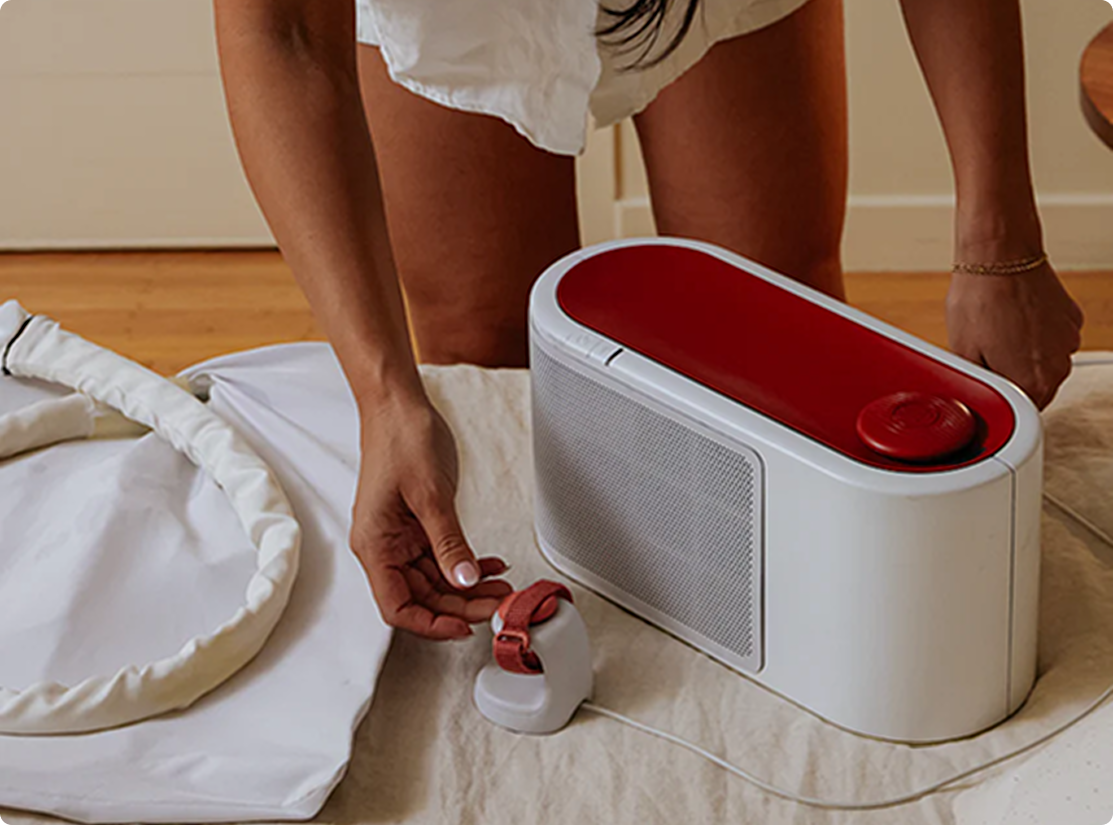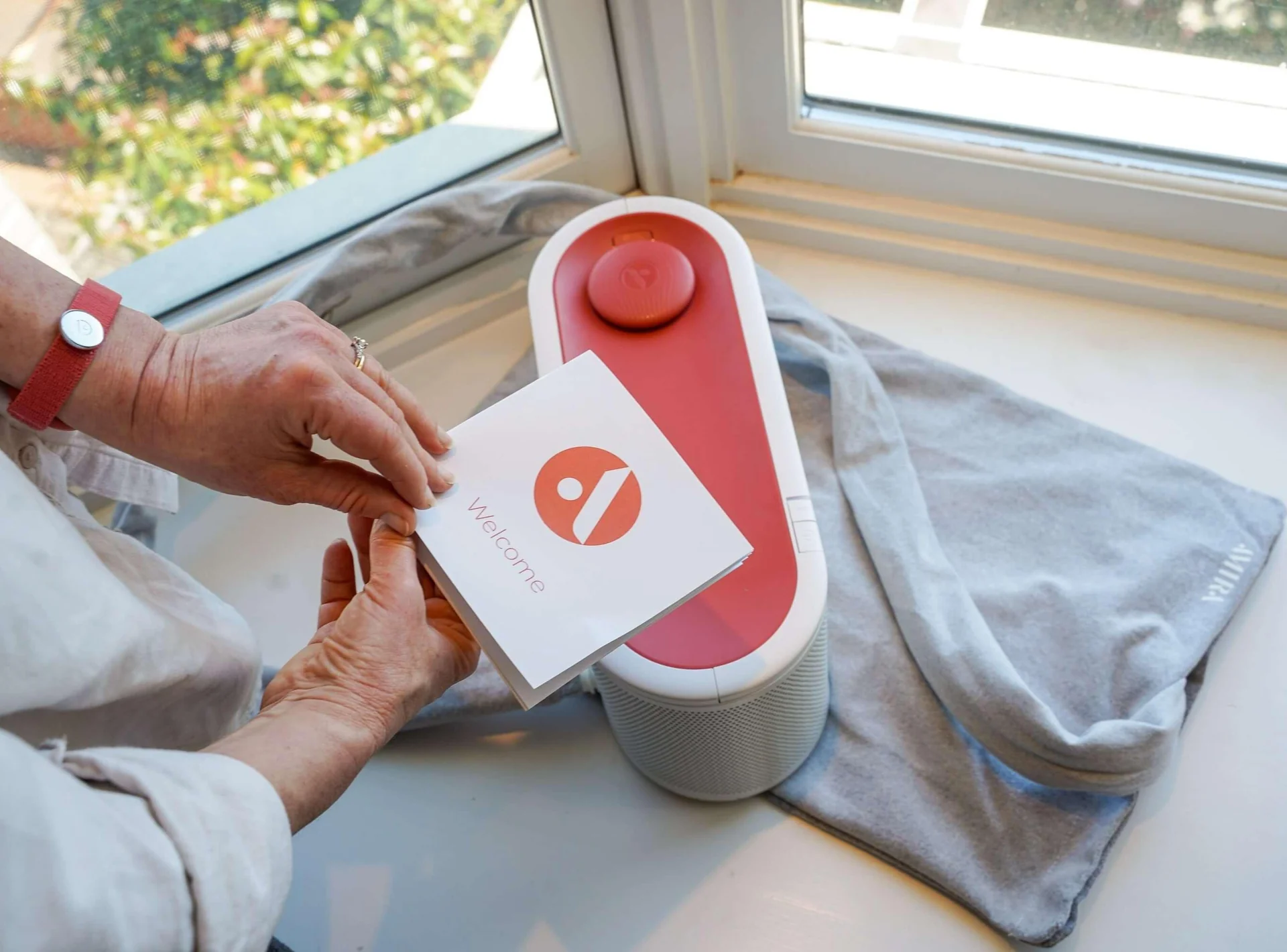
Stress Relief During Menopause: Effective Techniques for Women
- Written by: Corentin Hugot
- Reading time: ~6min
Feeling overwhelmed by the emotional rollercoaster of menopause? You're not alone. Between hot flashes, sleep disruption, and hormonal shifts, stress can feel like an unwelcome constant companion during this transition.
This post will explore practical and effective stress relief techniques specifically tailored for women navigating menopause, helping you regain balance and improve your overall well-being.
Managing stress is crucial during menopause as it can exacerbate symptoms like hot flashes, night sweats, and sleep problems. Finding calm isn't just about feeling better emotionally; it's key to managing physical symptoms and improving quality of life. Better sleep contributes significantly to resilience and overall health.
Understanding Menopause and Stress: The Crucial Need for Effective Stress Management
Menopause is a natural biological process marking the end of a woman's reproductive years, typically occurring in the late 40s or early 50s. It's characterized by a decline in estrogen and progesterone production by the ovaries, leading to a variety of physical and emotional changes. These changes can be significant stressors, highlighting the importance of effective stress management during this life stage.
The Physiology Link: How Changing Hormones Impact Your Stress Response
The hormonal fluctuations of menopause have a direct impact on your body's stress response. Estrogen and progesterone play a role in regulating the hypothalamic-pituitary-adrenal (HPA) axis, which controls the release of cortisol, the primary stress hormone. When estrogen levels decline, the HPA axis can become more reactive, leading to increased cortisol production in response to stressors. This can result in heightened feelings of anxiety, irritability, and difficulty managing stress.
The interaction between these hormones is complex. Estrogen, for example, has a calming effect on the nervous system. Its decline can make you more susceptible to feeling stressed and anxious. Progesterone, on the other hand, has natural anti-anxiety and sleep-promoting properties. Its reduction can contribute to sleep disturbances and increased anxiety levels. The interplay between these hormonal shifts and the body's stress response creates a cycle where stress can worsen menopausal symptoms, and vice versa.
Common Menopause-Related Stressors: Identifying Your Triggers
Several factors contribute to stress during menopause. These stressors can be broadly categorized as physical symptoms, sleep issues, and life changes.
- Physical Symptoms: Hot flashes, night sweats, vaginal dryness, and weight gain are common physical symptoms that can cause significant distress. The unpredictability and discomfort associated with these symptoms can lead to anxiety and frustration. If you're looking for ways to cope, you can discover effective approaches to manage hot flashes.
- Sleep Issues: Sleep disturbances, such as insomnia and night sweats, are frequently reported during menopause. Lack of sleep can exacerbate stress, mood swings, and cognitive difficulties.
- Life Changes: Menopause often coincides with other significant life changes, such as career transitions, children leaving home, caring for aging parents, and relationship changes. These transitions can add to the overall stress load.
Identifying your specific stressors is the first step in developing effective stress management strategies. Keeping a journal to track your symptoms, mood, and potential triggers can help you gain insight into what contributes to your stress levels.
The Vicious Cycle: How Stress Can Worsen Menopausal Symptoms
Stress and menopause symptoms often create a vicious cycle. Stress can exacerbate menopausal symptoms, while those same symptoms can in turn amplify feelings of stress.
Specifically, stress has been linked to increased frequency and intensity of hot flashes and night sweats. When you're stressed, your body releases adrenaline and cortisol, which can trigger hot flashes by affecting the body's temperature regulation. The discomfort and disruption caused by these episodes can further increase anxiety and stress, perpetuating the cycle.
Similarly, stress can worsen sleep disturbances. Worry and anxiety can make it difficult to fall asleep or stay asleep, leading to fatigue and irritability. Lack of sleep can further impair the body's ability to cope with stress, making menopausal symptoms feel more intense.
Breaking this vicious cycle requires proactive stress management techniques. By effectively managing stress, you can reduce the severity of menopausal symptoms and improve your overall well-being.
Navigating Emotional Shifts: Managing Anxiety and Mood Swings Linked to Hormone Imbalance
Menopause is often accompanied by emotional shifts, including anxiety, mood swings, and irritability. These emotional changes are largely due to the fluctuating hormone levels that characterize this transitional phase.
Recognizing Menopause-Related Anxiety: Symptoms and Signs
Menopause-related anxiety can manifest differently from general anxiety disorders. While some symptoms overlap, there are distinct characteristics to be aware of.
Common symptoms of menopause-related anxiety include:
- Increased worry and apprehension: Feeling constantly on edge or anticipating negative outcomes.
- Irritability and mood swings: Experiencing sudden shifts in mood, often with heightened sensitivity.
- Difficulty concentrating: Feeling scattered, forgetful, and struggling to focus on tasks.
- Sleep disturbances: Experiencing insomnia, restless sleep, or waking up frequently during the night.
- Physical symptoms: Experiencing physical symptoms like heart palpitations, muscle tension, headaches, and digestive issues.
It's important to differentiate menopause-related anxiety from general anxiety disorders. Menopause-related anxiety is often linked to specific triggers, such as hot flashes or sleep disturbances. It may also fluctuate with hormonal changes throughout the day. If you have a history of anxiety disorders, menopause may exacerbate your existing symptoms.
Cognitive Strategies: Reframing Negative Thoughts and Practicing Self-Compassion
Cognitive strategies can be powerful tools for managing anxiety and mood swings during menopause. These strategies involve changing your thought patterns and developing a more positive and compassionate outlook.
- Reframing Negative Thoughts: This involves challenging negative thoughts and replacing them with more balanced and realistic ones. For example, instead of thinking, "I can't handle these hot flashes," you might reframe it as, "These hot flashes are uncomfortable, but they will pass. I can use cooling techniques to manage them."
- Practicing Self-Compassion: This involves treating yourself with the same kindness and understanding you would offer a friend. Acknowledge that menopause is a challenging transition, and it's okay to feel overwhelmed or frustrated. Practice self-care activities that nurture your emotional and physical well-being.
- Mindfulness and Acceptance: Learning to observe your thoughts and emotions without judgment can help reduce anxiety. Mindfulness practices can help you accept the discomfort of menopausal symptoms without resisting them.
When to Seek Support: Knowing When Professional Help is Beneficial
While self-help strategies can be effective for managing mild to moderate anxiety, it's important to recognize when professional help is needed.
Consider seeking support from a therapist, counselor, or doctor if:
- Your anxiety is significantly impacting your daily life, work, or relationships.
- You are experiencing persistent and severe symptoms of anxiety.
- You have a history of anxiety disorders or other mental health conditions.
- You are feeling overwhelmed or unable to cope with your symptoms.
Therapy can provide you with coping skills, emotional support, and guidance in managing anxiety and mood swings. Support groups can connect you with other women experiencing similar challenges, fostering a sense of community and reducing feelings of isolation. Your doctor can assess your symptoms, rule out other medical conditions, and discuss potential treatment options, such as hormone therapy or medication.
Practical Relaxation Techniques to Enhance Menopausal Well-being
Incorporating relaxation techniques into your daily routine can significantly reduce stress and improve your overall well-being during menopause. These techniques can help calm your nervous system, reduce muscle tension, and promote a sense of peace and tranquility.
The Power of Breath: Simple Deep Breathing Exercises for Instant Calm
Deep breathing exercises are a simple yet powerful tool for managing stress and anxiety. They can be practiced anywhere, anytime, and require no special equipment.
Here's a basic deep breathing exercise:
- Find a comfortable position, either sitting or lying down.
- Close your eyes and focus on your breath.
- Inhale slowly and deeply through your nose, allowing your abdomen to expand.
- Hold your breath for a few seconds.
- Exhale slowly and completely through your mouth, releasing any tension.
- Repeat for 5-10 minutes.
Deep breathing exercises activate the parasympathetic nervous system, which promotes relaxation and reduces heart rate and blood pressure. Practicing these exercises regularly can help you develop a greater sense of calm and resilience to stress.
Progressive Muscle Relaxation (PMR): Releasing Physical Tension Step-by-Step
Progressive Muscle Relaxation (PMR) is a technique that involves tensing and relaxing different muscle groups in your body. This helps you become more aware of physical tension and learn how to release it.
Here's a simplified version of PMR:
- Find a quiet and comfortable place to lie down.
- Close your eyes and focus on your breath.
- Start with your feet. Tense the muscles in your feet as tightly as you can for 5-10 seconds.
- Release the tension and notice the difference in how your muscles feel.
- Repeat this process with each muscle group in your body, working your way up from your feet to your head. Muscle groups include: calves, thighs, buttocks, abdomen, chest, back, arms, hands, shoulders, neck, and face.
PMR can help reduce muscle tension, relieve headaches, and promote relaxation. Practicing PMR regularly can improve your overall sense of well-being.
Sensory Soothing: Using Aromatherapy, Calming Music, or Warm Baths
Engaging your senses can be a powerful way to soothe your nervous system and reduce stress. Aromatherapy, calming music, and warm baths are all examples of sensory soothing techniques.
- Aromatherapy: Certain essential oils, such as lavender, chamomile, and sandalwood, have calming and relaxing properties. You can use essential oils in a diffuser, add them to a bath, or apply them topically (diluted in a carrier oil).
- Calming Music: Listening to soothing music can help reduce stress and promote relaxation. Choose music that you find enjoyable and that has a calming effect on you.
- Warm Baths: Taking a warm bath can help relax your muscles and soothe your nervous system. Add Epsom salts, essential oils, or bath bombs to enhance the experience. Note: Suggest timing baths carefully if prone to heat-triggered flashes.
Experiment with different sensory soothing techniques to find what works best for you. Incorporating these techniques into your daily routine can help you manage stress and improve your overall well-being.
Mindfulness for Menopause: Staying Present to Reduce Stress and Enhance Awareness
Mindfulness is the practice of paying attention to the present moment without judgment. It involves focusing on your thoughts, feelings, and sensations without getting carried away by them. Mindfulness can be a powerful tool for managing stress and enhancing awareness during menopause.
Introduction to Mindfulness: What It Is and Why It Helps During Menopause
Mindfulness is a mental state achieved by focusing one's awareness on the present moment, while calmly acknowledging and accepting one's feelings, thoughts, and bodily sensations. It's about being present in the "now" rather than dwelling on the past or worrying about the future.
During menopause, mindfulness can be particularly helpful for several reasons:
- Reduces Stress: Mindfulness helps you become more aware of your stress triggers and develop coping mechanisms for managing stress.
- Enhances Awareness: Mindfulness helps you become more attuned to your body's signals, allowing you to identify and respond to your needs more effectively.
- Promotes Emotional Regulation: Mindfulness helps you regulate your emotions, reducing mood swings and irritability.
- Improves Sleep: Mindfulness can help you calm your mind and relax your body, promoting better sleep.
Simple Mindfulness Practices: Body Scan Meditation and Mindful Moments Throughout Your Day
There are many different mindfulness practices you can try. Here are a couple of simple ones to get you started:
- Body Scan Meditation: This involves focusing your attention on different parts of your body, noticing any sensations without judgment. Start by lying down in a comfortable position. Close your eyes and focus on your breath. Then, slowly bring your attention to your toes. Notice any sensations, such as tingling, warmth, or pressure. Gradually move your attention up your body, from your feet to your head.
- Mindful Moments Throughout Your Day: You can incorporate mindfulness into your daily routine by paying attention to the present moment during everyday activities. For example, when you're brushing your teeth, focus on the sensations of the toothbrush on your teeth and the taste of the toothpaste. When you're eating, focus on the taste, texture, and smell of your food.
Mindful Acceptance: Coping with Discomfort (like hot flashes) Without Judgment
Mindful acceptance is a key aspect of mindfulness practice. It involves accepting your thoughts, feelings, and sensations without judgment. This is particularly helpful for coping with discomfort, such as hot flashes, during menopause.
Instead of resisting or fighting against a hot flash, try to observe it without judgment. Notice the sensations in your body, such as the heat, sweating, and heart palpitations. Acknowledge that the hot flash is uncomfortable, but remind yourself that it will pass. By accepting the discomfort without judgment, you can reduce your anxiety and stress.
Embracing Movement: How Exercise Supports a Healthy Lifestyle Through Menopause
Regular exercise is an essential component of a healthy lifestyle during menopause. It offers numerous physical and emotional benefits, including stress reduction, improved mood, and better sleep.
The Mood-Boosting Benefits of Regular Exercise: Releasing Endorphins Naturally
Exercise is a natural mood booster. When you exercise, your body releases endorphins, which have mood-elevating and pain-relieving effects. Endorphins can help reduce stress, anxiety, and depression.
Regular exercise can also improve your self-esteem and body image. As you become stronger and healthier, you'll likely feel more confident and positive about yourself.
Finding Your Fit: Types of Exercise Ideal for Menopause
The best type of exercise for menopause is one that you enjoy and can stick with long-term. Here are some options to consider:
- Yoga and Tai Chi: These mind-body practices can help reduce stress, improve flexibility, and promote relaxation.
- Walking and Swimming: These are low-impact cardio exercises that are gentle on your joints and can improve your cardiovascular health.
- Strength Training: Strength training helps build muscle mass, which can boost your metabolism and improve your bone density.
Consistency Over Intensity: Building a Sustainable Exercise Routine for Long-Term Well-being
When it comes to exercise, consistency is more important than intensity. Aim for at least 30 minutes of moderate-intensity exercise most days of the week. Start slowly and gradually increase the intensity and duration of your workouts as you get stronger.
It's also important to listen to your body and rest when you need to. Overtraining can lead to injuries and burnout.
How Better Sleep Enhances Exercise Motivation
Quality sleep is essential for maintaining energy levels and motivation to exercise. When you're well-rested, you're more likely to feel motivated to work out. Aim for 7-8 hours of sleep per night. Improving sleep quality, perhaps with solutions like a cooling mattress pad to manage night sweats, can significantly boost your energy and make it easier to stick to a regular exercise routine.
FAQ Section
Q1: Can stress actually make my hot flashes and night sweats worse during menopause?
Yes, studies have shown a direct link between stress levels and the frequency and intensity of hot flashes and night sweats. When you're stressed, your body releases hormones like cortisol and adrenaline, which can disrupt the body's temperature regulation and trigger these symptoms.
Q2: What are some quick stress relief techniques I can use when I feel overwhelmed?
Deep breathing exercises are a great option for quick stress relief. Take a few slow, deep breaths, focusing on expanding your abdomen as you inhale and releasing tension as you exhale. Another technique is to practice mindfulness by focusing on your senses – notice what you see, hear, smell, taste, and touch in the present moment.
Q3: How does hormone imbalance contribute to increased anxiety during menopause?
The decline in estrogen and progesterone during menopause can affect neurotransmitters in the brain that regulate mood and anxiety. Lower levels of these hormones can lead to increased irritability, mood swings, and feelings of anxiety.
Q4: Are there specific relaxation techniques that are better for menopausal women?
While all relaxation techniques can be beneficial, practices like yoga, Tai Chi, and mindfulness are particularly helpful for menopausal women. These techniques combine physical movement with mental focus, which can help reduce stress, improve sleep, and manage mood swings.
Q5: Beyond stress management techniques, what other healthy lifestyle changes support well-being during menopause?
In addition to stress management, maintaining a healthy diet, getting regular exercise, prioritizing sleep, and staying connected with social support networks can all contribute to improved well-being during menopause.
Conclusion
Menopause brings unique stressors, but effective stress management is achievable. Techniques like mindfulness, relaxation exercises, and physical activity are powerful tools. Managing stress is vital for mitigating symptoms like hot flashes and improving overall quality of life.
Ready to feel more calm and in control during your menopausal journey? Start by incorporating one new relaxation technique into your daily routine this week. Share your favorite stress relief tip in the comments below!

Sleep Cool, Wake Refreshed
Terra’s smart cooling system stops hot flashes before they wake you.
Predicts & cools in seconds
No noise, no interruptions
Wake up refreshed





